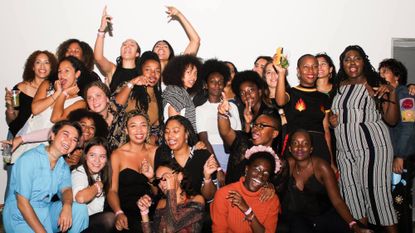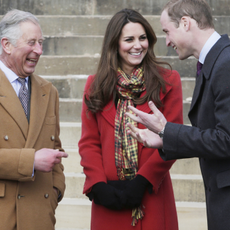When you're a woman of colour living in the UK, where is home?
Gal-dem's Niellah Arboine explores the theme of home

Gal-dem's Niellah Arboine explores the theme of home
Words by Niellah Arboine
As part of ASOS Supports Talent's global initiative supporting young creatives
The idea of what home is can be complex, confusing and multidimensional for women of colour living in Britain. When we’re split between identities, ethnicities and nationalities, what home is to us isn't straightforward.
Something that’s a simple answer for most, suddenly takes a lot of thought for me to unpick.
If you had asked me a few years ago what home was, I’d say my family home nestled on a quiet road in south London under the shadow of an ornamental cherry tree. Every spring I'd try a cherry hoping this year they would be sweet. I'd tell you home was picnics on Clapham Common, school girls in gingham dresses and frilly socks. Or that home was saying hello to aunties that definitely had no relation to me or sitting between my mother's legs swallowing back tears as she combed through my hair.
Although London, and the house I grew up in is a part of my identity, I know the concept of home for me wasn’t that simple.
Marie Claire Newsletter
Celebrity news, beauty, fashion advice, and fascinating features, delivered straight to your inbox!
I live in a country that reminds me that Britain can't be my actual home because of the colour of my skin. I'm frequently asked 'where are you from?' and when I reply 'London' or something to that effect, bemused faces gawk back and ask me the question again, but much slower: 'No, but where are you really from?'
This is a gentle reminder that I don't fully belong. Even though less than 50% of Londoners are white British, even though I was born in Saint Thomas’ hospital, I can only speak English and I’m burdened with an awful case of British politeness, I'm still not fully allowed to call this island home.
So like a nomad, my identity wanders off in search of a new home. I turn to a different island to call my home. Jamaica, that’s where my grandparents were born and lived before moving to the UK in the 50s. Every summer as a child, my brother and I would go to Jamaica to stay up in the mountains with my grandmother. I'd run barefoot in the yard with the other children. We’d chew on sugarcane, and mangos and dance in the warm rain. I’d sneak out of church (which was a whole day event) and go to the small shop on the side of the road to buy coconuts or a june plum in a bag of salt.
Jamaica was home for me but only for the summer and now only nostalgically. My grandma’s neighbours would refer to me as 'english gyal' and ask me if I had any gifts from 'Hinglan' for them. Sometimes I couldn't understand the patois and would bobble my head in agreement to anyone who spoke to me. I remember my mother would pack jars of pesto sauce and Sainsbury's pasta in our suitcases because truthfully our tongues weren't always fully Jamaican.
To be part of the black diaspora means that you're always homesick but you can also make a home out of anywhere. Sometimes I get a strange sense of loss, loss for my identity. I know my family are Jamaican but anything beyond that is like a foggy and forgotten memory.
Home is beer gardens with my friends and it's sitting in pews in my grandma's church for hours. Home is art galleries, it's family, it's nostalgic songs that take me back to my childhood. For me, home is everywhere and nowhere all at once.
The leading destination for fashion, beauty, shopping and finger-on-the-pulse views on the latest issues. Marie Claire's travel content helps you delight in discovering new destinations around the globe, offering a unique – and sometimes unchartered – travel experience. From new hotel openings to the destinations tipped to take over our travel calendars, this iconic name has it covered.
-
 Zendaya's reaction to awkward kissing question during Challengers interview has gone viral
Zendaya's reaction to awkward kissing question during Challengers interview has gone viral'Uncomfortable' doesn't begin to cover it
By Iris Goldsztajn
-
 Prince William feels 'immense responsibility' amid Kate and Charles cancer diagnoses
Prince William feels 'immense responsibility' amid Kate and Charles cancer diagnosesHe has a lot on his plate
By Iris Goldsztajn
-
 Taylor Swift just teased a 'timetable' for her new album release
Taylor Swift just teased a 'timetable' for her new album releaseThe wait is torture
By Iris Goldsztajn